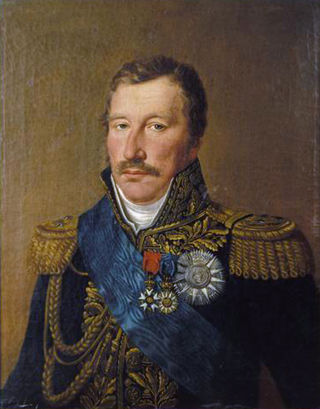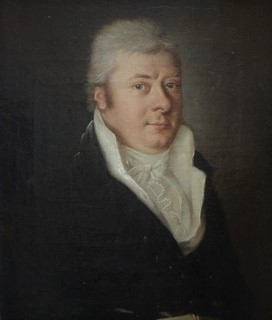Related Research Articles

Dirk van Hogendorp, comte de l'Empire, was a Dutch officer; colonial administrator; diplomat and Minister of War, for the Kingdom of Holland; and confidant of Napoleon. In 1812 he was governor of Vilnius, in 1813 he was appointed as the governor of Hamburg. He was an early critic of the Dutch colonial system as implemented under the VOC. His ideas about reforms in the Dutch East Indies were to a large extent realized by the Commissioners-General of the Dutch East Indies, through the behind the scenes influence of his friend Herman Warner Muntinghe, first as adviser of Stamford Raffles, and later as adviser of the Commissioners-General.

Godert Alexander Gerard Philip, Baron van der Capellen was a Dutch statesman. He held several important posts under the Kingdom of Holland and the Sovereign Principality of the United Netherlands, before he was appointed as one of the Commissioners-General of the Dutch East Indies. Later he was appointed Governor-General of that colony.

Johannes, Count van den Bosch was a Dutch officer and politician. He was Governor-General of the Dutch East Indies (1830–1833), commander of the Royal Netherlands East Indies Army, Minister of Colonies, and Minister of State. He was an officer in the Military William Order.

The Great Post Road is the name for the historical road that runs across Java that connects Anyer and Panarukan. It was built during the reign of Herman Willem Daendels (1808–1811), governor-general of the Dutch East Indies, using unpaid forced labor that cost thousands of lives.

The 1740 Batavia massacre was a massacre and pogrom in which European soldiers of the Dutch East India Company killed ethnic Chinese residents of the port city of Batavia, Dutch East Indies, in the Dutch East Indies. The violence in the city lasted from 9 October 1740, until 22 October, with minor skirmishes outside the walls continuing late into November that year. Historians have estimated that at least 10,000 ethnic Chinese were massacred; just 600 to 3,000 are believed to have survived.

Paulus Roelof Cantz'laar was a Dutch naval officer and colonial governor. He served as Governor of Curaçao and Dependencies from 16 November 1820 until April 1828, and Governor of the Dutch West Indies from 20 May 1828 tot 15 December 1831.

Carl Heinrich Wilhelm Anthing was a German officer, in Dutch service under several successive regimes, starting with the Dutch Republic, and followed by the Batavian Republic, the Kingdom of Holland, and the First French Empire, to end up in the United Kingdom of the Netherlands, where he led the Indies Brigade, both at Waterloo, and finally to the Dutch East Indies, where it would be the core of the future Royal Netherlands East Indies Army.

The French and British interregnum in the Dutch East Indies of the Dutch East Indies took place between 1806 and 1816. The French ruled between 1806 and 1811, while the British took over for 1811 to 1816 and transferred its control back to the Dutch in 1816.
The Commissioners-General of the Dutch East Indies was a commission instituted by the Dutch king William I of the Netherlands in 1815 to implement the provisions of the Anglo-Dutch Treaty of 1814 and take over the government of the Dutch Indies from the British lieutenant-governor of Java, John Fendall. The commission consisted of the following three members: Godert van der Capellen, Arnold Adriaan Buyskes, and Cornelis Theodorus Elout. One of their tasks was to implement a new Regeringsreglement for the colony that they carried in draft-form with them. But instead they promulgated a much-amended version of that draft at the end of their mission in 1818. It embodied a transition from the "Trade Colonialism" of the VOC to an embryonic form of "Imperial Power Colonialism", which would come to full fruition during the 19th century. The "constitution" they wrote would remain in force for the Dutch East Indies in the main, though with important amendments, like the institution of the Volksraad, until the end of Dutch colonial rule.

Abraham de Veer was a Dutch colonial administrator, who served as governor of Curaçao (1803–1804); the Dutch Gold Coast (1810–1816); Sint Eustatius, Saba and Sint Maarten (1817–1822); and Suriname (1822–1827).

Jan Gerard Wichers was a military officer and lawyer. He served as Governor of Suriname from 1784 until 1790.

Johannes Herbert August Willem, Baron van Heerdt tot Eversberg was a Dutch naval officer, civil servant, and colonial administrator. He served as Governor of Curaçao and Dependencies from 1 October 1880 until 18 October 1882, and Governor of Suriname from 11 November 1882 until 1 August 1885.

Jonkheer François Daniël Changuion, commonly known as Daniël Changuion, was a Dutch administrator and diplomat. Some of his descendants settled in South Africa in the nineteenth century.

Cornelis Theodorus Elout was a Dutch statesman. As Commissioner of the Dutch East Indies he instituted the landrente tax system in the Dutch East Indies in 1816, and in 1819 promulgated the new Regeringsreglement for that colony together with his colleagues Godert van der Capellen and Arnold Adriaan Buyskes, while also reforming the coinage. After his return to the Netherlands he served as Minister of Finance, Industry, Colonies, and the Navy. He was instrumental in founding the Nederlandsche Handelsmaatschappij. He opposed the introduction of the Cultuurstelsel in the East Indies, but was overruled, and resigned in protest.

Arnold Adriaan Buyskess was a Dutch naval officer, who also served as a Commissioner-General of the Dutch East Indies from 1816 to 1819. Before that he had been Daendels lt.-Governor-General on Java from 1808 to 1809. He successfully led the punitive expedition against the insurgents in the Moluccas in 1817.
Jacob Andries van Braam was a Dutch opperkoopman of the VOC and member of the High Government of the Dutch East Indies.
Petrus Theodorus baron Chassé was a Dutch colonial administrator, who was opperhoofd of Dejima under the VOC and governor of Dutch Celebes at Makassar under the Batavian Republic, and who ultimately became a member of the High Government of the Dutch East Indies.
Reinier d'Ozy was a Dutch colonial administrator who rose to be a member of the High Government of the Dutch East Indies.
The Oudgastenpartij was a political faction hostile to the reforms of the Commissioners-General of the Dutch East Indies and to the subsequent rule of governor-general Godert van der Capellen who were active in the first third of the 19th century in the colonial Dutch East Indies.

Hendrik Jan van de Graaff was a Dutch jurist who became a Raad van Indië in 1820, and was an ally of governor-general Godert van der Capellen, until he was recalled in 1826.
References
- ↑ Kloot, M.A. van der (1862). "Opgave nopens de Hooge regering van Nederlandsch Indië, van 1816 tot 1860". Bijdragen tot de Taal-, Land- en Volkenkunde van Nederlandsch Indië (in Dutch). 8: 26. Retrieved 4 June 2023.
- 1 2 3 Blok and Molhuysen, p. 966
- ↑ "Herman Warner Muntinghe". geni.com (in Dutch). Retrieved 7 April 2023.
- ↑ Wright, H.R.C. (1952). "Muntinghe's advice to Raffles on the land question in Java". Bijdragen tot de Taal-, Land- en Volkenkunde. 108 (3): 220–247. doi: 10.1163/22134379-90002430 . JSTOR 27859777 . Retrieved 7 April 2023.
- ↑ Oranje, pp.89-92
- ↑ Oranje, p. 104
- ↑ Oranje, pp. 40-41, 98
- 1 2 3 4 5 Blok and Molhuysen, p. 967
- ↑ Oranje, pp. 109-110
- ↑ "Ch. XIV Asia. The protest of Sir S. Raffles against the Proceedings of the Dutch in the Malayan Archipelago Treaties formed with the Princes of Sumatra". The Annual Register: 216–232. 1820. Retrieved 7 April 2023.